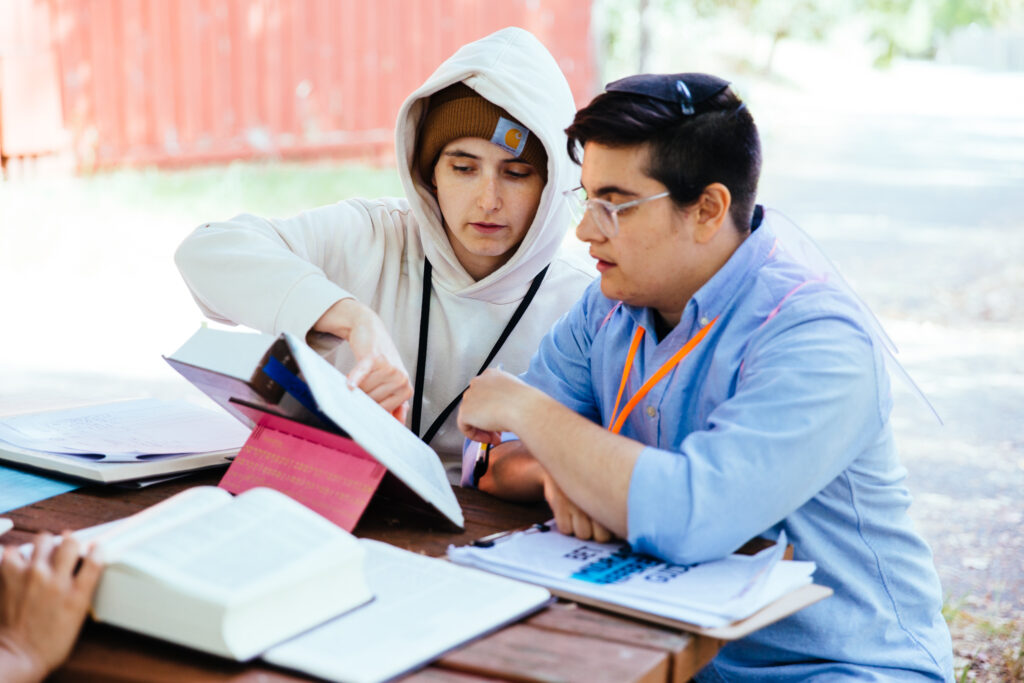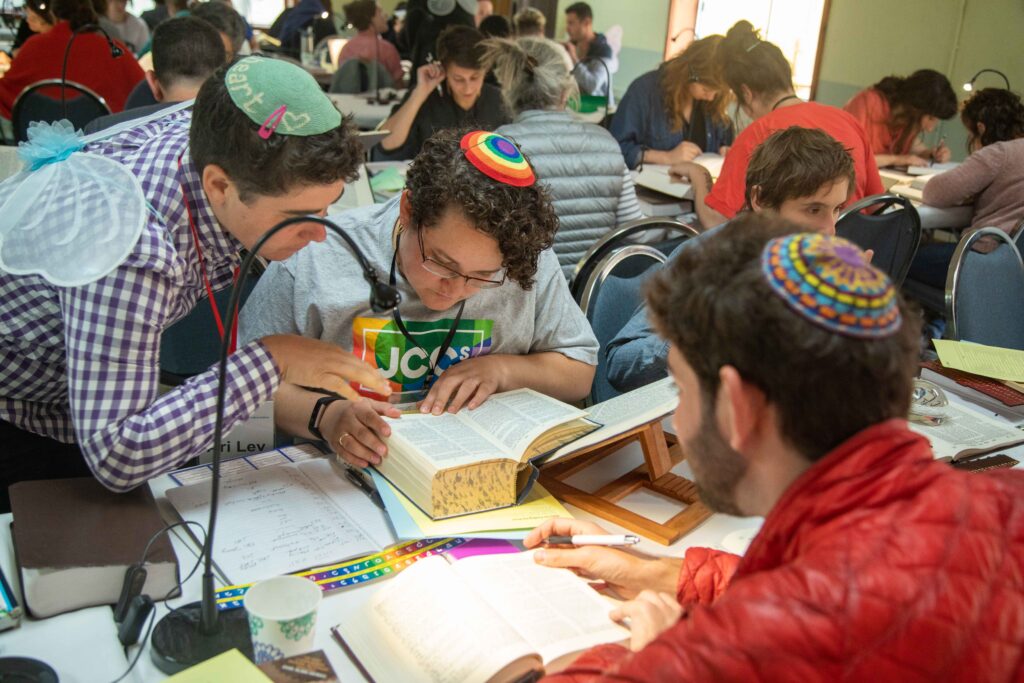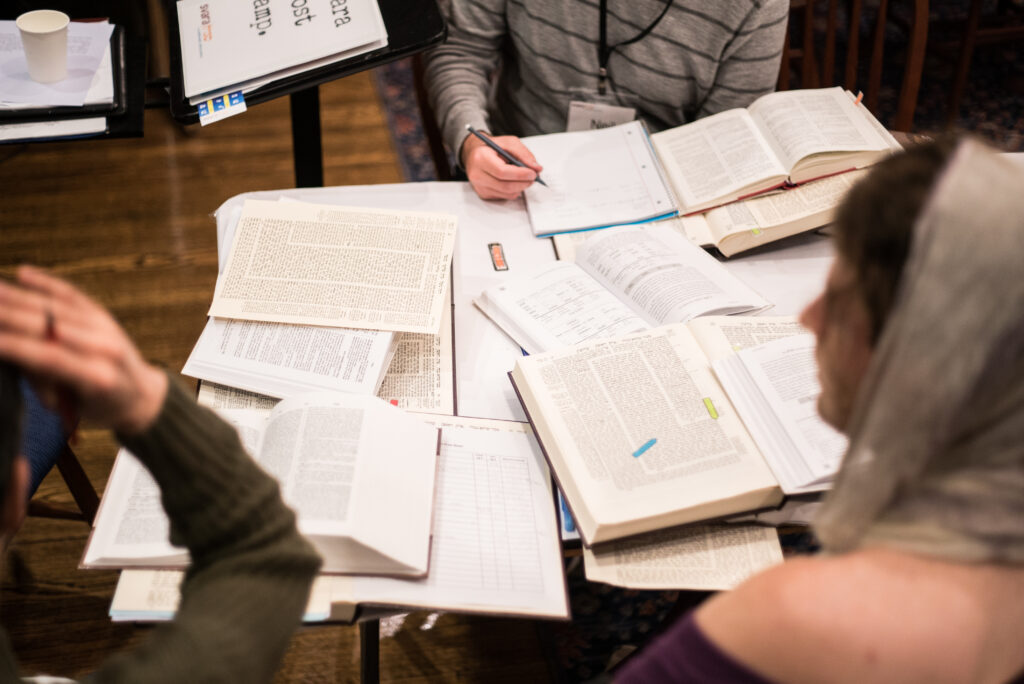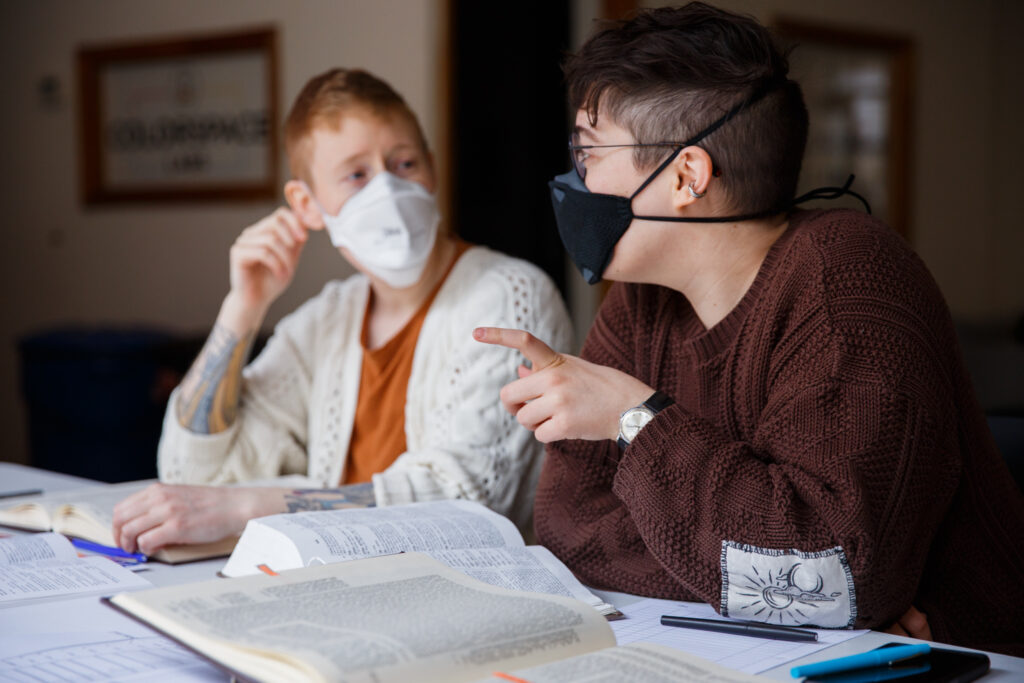On March 26, 2023 / 4 Nissan 5783, over 300 folks gathered for a day of learning with the Trans Halakha Project to celebrate the publication of two resources: a series of teshuvot—halakhic Q&A’s—and Tefillat Trans—a compilation of blessings and rituals for sacred moments. I was fully of equal parts ahavah (love) and yirah (awe), a profound sense of love for the folks who offered their Torah so generously and expansively in these resources coupled with a deep embodied sense of awe. It’s not an overstatement that reading and editing these teshuvot over the past two months has been a highlight of my Torah-learning life.
As we started the event, I asked folks to share what brought them into the (Zoom) room:
- Out of deep love for the trans and nonbinary jews who helped me fall in love with judaism
- Because a Judaism that endangers anyone is no Judaism of mine
- I’m here bc trans joy is resistance
- Because trans wisdom enriches torah for all of us <3
- Because this is how we build a Jewish future!
This was my answer:
What’s bringing me here is that I am tired of experiencing dysphoric halakha–the pervasive way of relating to trans folks as “issues” to be solved within halakha. I want to experience–and I want us all to experience–euphoric halakha, halakha that finds the places where we fit, where we learn and feel something in our tradition that clicks, that feels blissful and powerful and holy and good. Euphoric hiddushim (innovations) like these are at the center of the works we are celebrating today. And as I read each of these teshuvot and looked through the pages of Tefillat Trans, I felt that sense of euphoria. We do not need to be solved. We need to be free.
What’s bringing me here that I yearn for halakha that moves, that flows, that is people-driven, that takes seriously the principles that have given it shape for thousands of years, and that responds to the deeply human needs of all of us–our bodies, our intuitions, the mess and the delight of being human together.
What’s bringing me here is a gemara that I learned, that offers a winding midrash in Sotah (22a) about who can, who must, and who may not teach: the Talmud tells us that to offer rulings without proper learning can be lead to deadly consequences, and to have learning without offering rulings can be equally dangerous. If we rule without knowing, we put people in danger. If we know and we don’t rule, we also put people in danger.
The Talmud’s pages are filled with sages who find themselves equally precedented and unprecedented. Like us, they sit in the holy and messy tension between chutzpah and humility. Like them, we have to teach, because so many of the people who are teaching now do not know. Cisgender halakhic decisors and teachers are ruling about us without the proper learning, and it has put us in danger. In the US and globally, legislators are ruling about us without the proper learning, and it has put us in danger.
As we learned from the slogan credited to disability rights activists in South Africa in the 90’s, halakhic language and treatments that are about us and completely without us are dangerous.
Today we’re publishing 10 teshuvot, with three more on the way—and hopefully more to come—that seek to answer our questions. And we’re publishing a compilation of berachot and tefillot (blessings and prayers) that have been curated from the existing practices and the creativity of trans folks. They demonstrate what happens when we stop asking “Can we exist?” and instead ask “How can we thrive?” They demonstrate what is possible when we take who we are as a given and as a blessing, and we read the tradition authentically through what we know to be true.
They are driven by and embody core principles that animate the rabbinic tradition, and in reading these teshuvot, I could feel these principles come alive.¹ Here are a few of them:
- deracheiha darchei noam / דרכיה דרכי נועם – that Torah is pleasure-full and pleasure filled, and the pursuit of mitzvot and Torah should not feel painful; if it is hurting us something is going wrong and needs to be addressed (Proverbs 3:17, Gittin 59b).
- lev yodea marat nafsho / לב יודע מרת נפשו – that our hearts know, that we have self-knowledge that is to be trusted and acknowledged as true, real expertise (Proverbs 14:10, Yoma 83a).
- minhag yisrael torah hi / מנהג ישראל תורה היא – that the minhag of our people is Torah, authentic and authoritative; when we want to know what we should do, we look to our people to find out (Berachot 45b).
- ein ledayan eleh mah she’einav ro’ot / אין לדיין אלא מה שעיניו רואות – that a judge has only what their eyes see; that we can rule only on that which we have seem, what we understand, and what we truly know (Bava Batra 131a).
- And finally, eilu ve’eilu divrei elohim chayim / אלו ואלו דברי אלהים חיים – these and also these are the words of the living G!d (Eruvin 13b) – that these teshuvot are all different. They’re written in the unique voices of their authors, they honor and cite each other, and they don’t all agree. It would be impossible to follow all of them, though I invite you to try.
Through the combination of these principles, these teshuvot bring new life to our tradition, and we hope they bring honor to our sages, to G!d, and to our people, and that they help us live halakha as it has always been lived: as a tool for creating powerful alternatives to guide our lives towards freedom and resist empires that seek to dominate us.
Last week at kiddish someone asked me, “So, are these teshuvot authoritative? What gives these teshuvot authority?” As has always been the case in our tradition, there is one thing that will make these teshuvot authoritative: y’all. If y’all use them, play in and with them, grapple with them, and learn them, they are real. So, I invite y’all today to take the first steps of making this Torah real as we learn them together.
Baruch atah HaShem, HaMelamed Torah le’Amo Yisrael.
Blessed are You G!d, and us, who teaches your Torah to our people.
1. One of my favorite articles that describes these principles is R’ Daniel Sperber, “Friendly Halakhah and The Friendly Poseq,” The Edah Journal (2006). If you’re in the mood for an academ-ish paper that digs into some of these principles, feel free to peruse this article that I had the pleasure of writing with SVARA-nik Russell Pearce.







